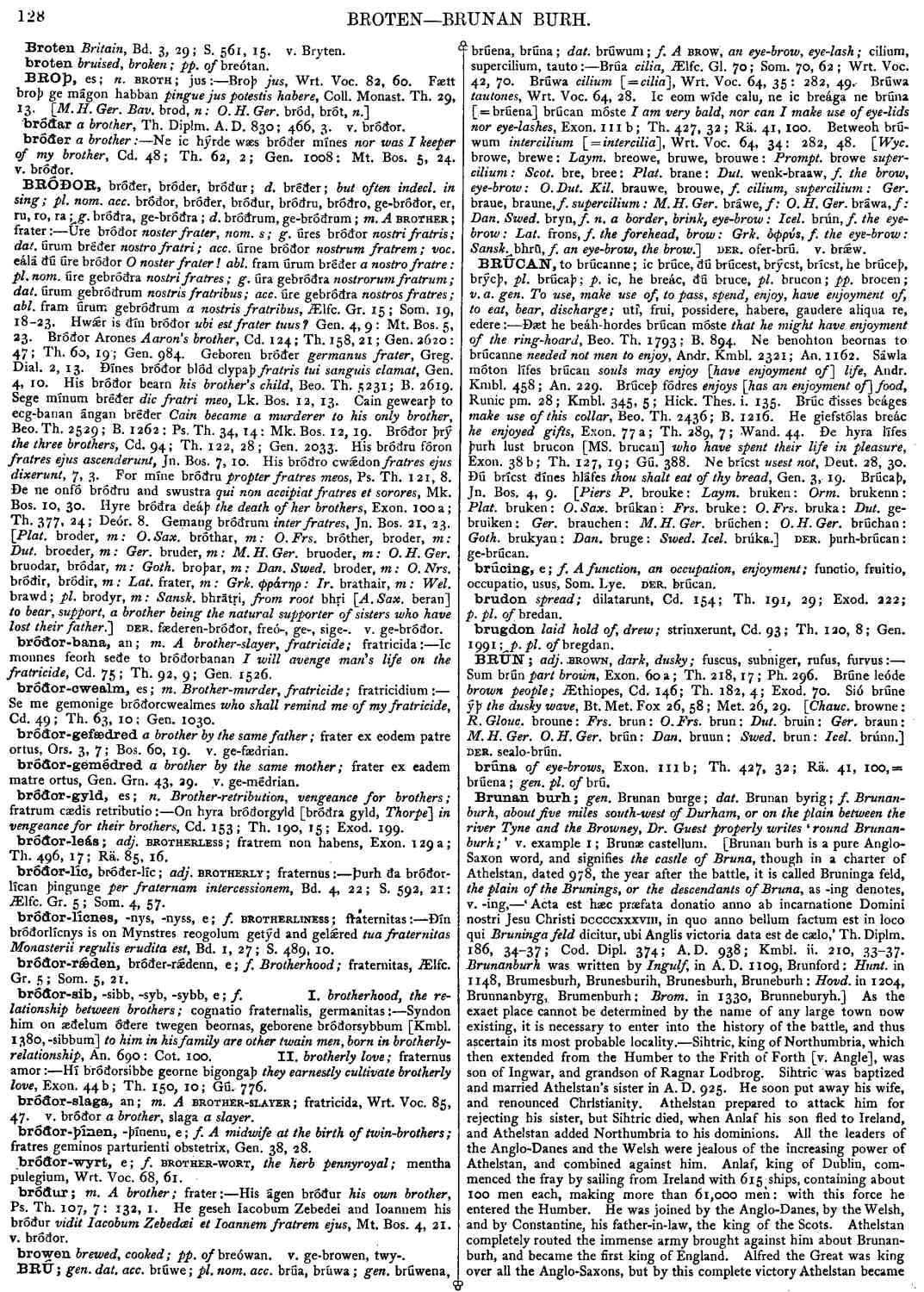Brunan burh
- noun [ feminine ]
- Dr. Guest properly writes 'round
Brunanburh;' v. example 1; Brunæ castellum. [Brunan burh is a pure Anglo-Saxon
word, and signifies the castle of Bruna, though in a charter of
Athelstan, dated 978, the year after the battle, it is called Bruninga feld,
the plain of the Brunings, or the descendants of Bruna, as -ing denotes,
v. -ing,—'Acta est hæc præfata donatio anno ab incarnatione
Domini nostri Jesu Christi DCCCCXXXVIII, in quo anno bellum factum est in loco qui
Bruninga feld dicitur, ubi Anglis victoria data est de cælo,' Th. Diplm.
186, 34-37; Cod. Dipl. 374; A.D. 938; Kmbl. ii. 210, 33-37. Brunanburh
was written by Ingulf, in A.D. 1109, Brunford: Hunt. in 1148,
Brumesburh, Brunesburih, Brunesburh, Bruneburh: Hovd. in 1204,
Brunnanbyrg, Brumenburh; Brom. in 1330, Brunneburyh.
-
Hér,DCCCCXXXVII,
Now, A. D. 937,
Æðelstán cing,
Athelstan king,
eorla drihten,
of earls the lord,
beorna beág-gifa,
of barons the bracelet-[beigh-] giver,
and his bróðor eác,
and his brother also [eke],
Eádmund æðeling,
Edmund the prince [etheling],
ealdor langne tír
elders a long train [tire]
geslógan æt sæcce [sake],
slew in battle,
sweorda ecggum,
with sword-edges,
embe Brunan burh.
round Brunanburh.
Gst. Rthm. ii. 60, 26-62, 3.
Ðǽr læg secg manig,
There lay many a soldier,
gárum forgrunden, —
by the darts brought low, —
guman norþerne,
northern men,
ofer scyld sceoten,
over shield shot,
swylce Scyttisc eác
so also [eke] the Scotchman's
wérig wígges sǽd.
wretched war-spawn.
Gst. Rthm. ii. 64, 1-4.
Fífe lágon
Five lay
on ðæm campstede —
on that battle-field [war-stead] —
ciningas geonge
youthful kings
sweordum aswefede;
sword-silenced;
swilce seofone eác
so also seven
eorlas Ánláfes,
earls of Anlaf,
unrím herges —
a host of the robber-band —
flotan and Scotta.
shipmen and Scots.
Gst. Rthm. ii. 64, 14-18.
Gewitan him ðá Norþmen
Went [gan] then the Northmen
nægled-cnearrum —
in their nailed barks —
[dreórig daroða láf
[the darts' sad leavings
on dynges mere]
on the noisy sea]
ofer deóp wæter,
over deep water,
Dyflen sécean
Dublin [Dyflen]
eft Iraland.
Ireland [the land of the Ire] to seek once
more.
Gst. Rthm. ii. 66, 19-22.
Ne wearþ wæl máre
Was no greater carnage
on ðísum [ðys] églande
ever yet,
ǽfre gyta, . . .
within this island, . . .
syððan eástan, hider
since from the east, hither
Engle and Sexan
up came
upp becóman.
Angles and Saxons [Engle and Sexe].
Gst. Rthm. ii. 68, 10-15.
Hér, A. D. 937, Æðelstán cyning lǽdde fyrde to Brunan byrig in this
year, A. D. 937,
king Athelstan led an army to Brunanburh,
- Chr. 937; Th. 201, 25-27, col. 2.
-
Hér,
- A. D. 937, Æðelstán [Æðestan MS.
king Athelstan and Edmund his brother led an army to Brunanburh: and there fought against Anlaf; and, Christ aiding, they had victory,
- Chr. 937; Erl. 113, 2-4.
Bosworth, Joseph. “Brunan burh.” In An Anglo-Saxon Dictionary Online, edited by Thomas Northcote Toller, Christ Sean, and Ondřej Tichy. Prague: Faculty of Arts, Charles University, 2014. https://bosworthtoller.com/5250.
Checked: 0